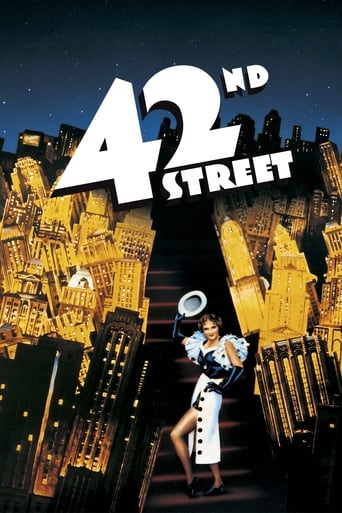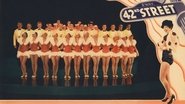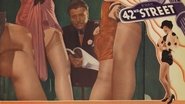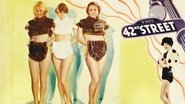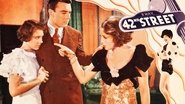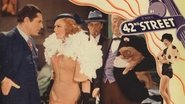Matt Greene
I think the titular 42nd St. must run right through DULLSVILLE, AMIRIGHT?!?! Other than the impressive stage sets and the (finally) exciting final number, this is a standard and fairly unremarkable love triangle / showbiz drama…that has an uncomfortable obsession with women's legs.
richspenc
When we see Ruby Keeler being introduced to the film, she gets teased by a few girls who lead her to almost walk into the men's room, and then to walk in on Dick Powell. Powell takes an immediate fondness to Ruby, just like in the other 1930s films with Powell and Ruby. I can never blame Powell, Ruby is beautiful and wonderful. We also meet beautiful girls Una Merkel and Ginger Rogers. Ginger is.'Anytime Annie', who "never says no except for once when she didn't hear the question". Una looked different in this film from some of her other films such as "Born to dance" and "Broadway Melody 36", not just younger (since this film came earlier from the other mentioned two) but she just looked sort of different altogether in this film. She was still very pretty just like in her other films. I loved her fun, quirky character in this film.Warner Baxter, who was warned by his doctor to take it easy, ignores him and finds his number one goal and dream, is to put on a dazzling, amazing show. If he can go through with that, nothing else matters. He is a very determined and aspiring director. The main story with rehearsals was very good in this film, along with good humor too. The musical numbers were wonderful. 42nd street, Shuffle off to Buffalo (with Ginger and Una sitting on a top bunk eating a banana), You're young and healthy , and You're getting to be a habit with me. Bebe Daniels likes Guy Kibby (I like the "things can never be the same now" bit), until Bebe calls Guy "you sucka!" while drunk at a party. I liked the passion between Ruby and George Brent (I think that this was the only of Busby's 1930s films where Ruby eloped with someone besides Powell. I cannot blame either of those guys though for being fond of lovely Ruby.I also found amusing near the beginning when Ruby was accepted into tryouts with the help of Powell, and Una and Ginger. We see them all throughout a couple of tryout scenes, then we get the scene where one of the slightly uppity girls is showing herself to the producers, and Ginger says "and is her homework tough", with Ruby laughing with Ginger and Una still standing amongst them. Then the film cuts to a moment after some more tryouts that weren't shown in the film, and now Ruby was asleep on a nearby bench while Warner was huffing about them being a girl short. Powell mentioned how Ruby was cut (somewhere between the previous shown tryout scenes and the present scene). Warner and his assistant call out to Ruby to wake up and all the girls on stage giggle. For some reason, I found all that very amusing, I liked that. I don't know why Ruby was cut when everyone seemed to like her the first time they saw her, and then they all looked quite happy to have her back (including Una I could see). I was happy to see Ruby back too.I loved the passionate moment from Warner to Ruby right before going on stage "You're going out an aspired actress and you're coming back a star!" His predictions were right on. Ruby shined beautifully through her songs, especially "42nd Street". But Ruby was wonderful through all.There's also a few cheeky lines in this film such as "you got the busiest hands" and "I'm sitting on a flagpole" from Una after a guy had crossed bounds with her a bit more than she wanted. Also Una doing an implicating gesture with her mouth after seeing Ruby and Powell together. Cheeky Una.
costakcpc
At one level this is less a musical and more a movie about musicals and theatre. Full of shonky businessmen, the odd sexual favour, a frustrated and cantankerous director, actors and dancers just wanting a piece of the action or struggling to get by. Throw in some quick one liners, numerous wannabes and there you have 42nd Street. And there's some dancing and singing. And there you have the template for Fame, Flashdance, Centre Stage et al. There are better musicals. But this is a very good movie about musicals.
vert001
42nd STREET is grounded in reality from its very first scene. The Depression had devastated Broadway and by 1932 even the lower priced film industry was finding its very survival threatened by the hard times. It was no joke that a successful actress (Bebe Daniels) would submit to an affair with a slimy tycoon (Guy Kibbee) in order to secure the backing for a new production. Nor was it a mere fancy that a famous stage director (Warner Baxter) would find himself penniless by way of the stock market, nor that he would resort to strong arm tactics to ensure a show's success. And that chorus girls would consider themselves lucky to have the opportunity of driving themselves into the ground when the real alternative was starvation? As Ginger Rogers would say in the next Berkeley extravaganza: "It's the Depression, dearie."This inherent grittiness of 42nd STREET was and would remain rare in what are normally straight 'musical comedies'. The alleged escapism of thirties' movies is much overstated. I doubt that any era's films were as obsessive about depicting the suffering engendered by contemporary conditions (certainly not our own, but that's another story). However, plots can always be slotted into a relatively small number of patterns. 42nd STREET in general gives us the story of a disparate group of people being brought together by a hard-driving leader with a vision in order to accomplish something, in this case putting on a show. In a military context you would have a disparate group of soldiers being molded into a unit by a hard-driving drill sergeant. Or the project could be some sort of business, or a political campaign. In 42nd STREET, it's show business.Putting the emphasis on the leader gives one sort of story, often a biography, but despite the fact that Warner Baxter's character probably remains its most important, 42nd STREET always keeps its emphasis on the process and eventually on the show itself. Its heart, I think, remains always the chorus girls pounding themselves into exhaustion in one montage after another. Until its final twenty minutes, 42nd STREET's plot consists of various character vignettes garnished with some very sharp comedy, particularly from our acid-tongued 'Greek Chorus', Lorraine (Una Merkel) and Anytime Annie (Ginger Rogers), the all underlined with a barely concealed desperation.42nd STREET's various plot elements were not all that original at the time and of course have become far less so in the intervening years; however, its emotional treatment of these elements is anything but cliché-ish. Its Warren and Dubin musical score is excellent, Berkeley's production numbers may give us our first taste of his surrealistic genius (I haven't seen his Eddie Cantor movies so I'm not sure about that), the cast is a brilliant mixture of veterans (Baxter in the performance of his career, and maybe the same could be said of Daniels) along with rising young talent (Dick Powell, Ginger Rogers, Ruby Keeler). This movie wasn't exactly the inventor of the clichés, it was the film that used them so memorably that they became set in our collective mind.There have been few musicals so wonderful as 42nd STREET.
